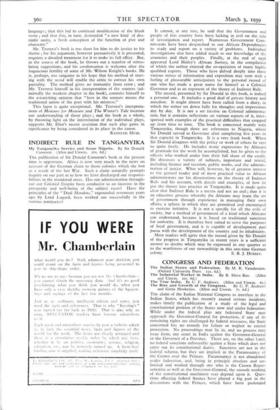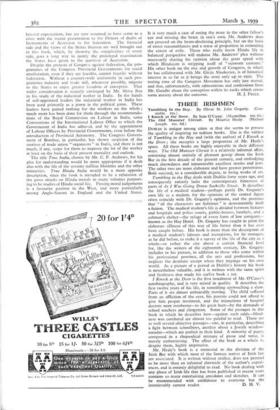CONGRESS AND FEDERATION
The Indian States and Federation. By M. K. Varadarajan. (Oxford University Press. I2s. 6d.)
The Industrial Worker in India. By B. Shiva Rao. (Allen and Unwin. los. 6d.)
THE claim of the Indian National Congress to interfere in the Indian States, which' has recently caused serious incidents, makes timely the publication of a study of the legal and
constitutional position of the States now and under federation.
While under the federal plan any federated State may approach the Governor-General for protection, if any of its remaining rights are challenged by federal measures, the State concerned has no remedy for failure or neglect to extend protection. No proceedings may lie in, and no process may issue from, any court in India against the Governor-General or the Governor of a Province. There are, on the other hand, no federal sanctions enforceable against a State which does not carry out its constitutional duties. Sanctions are not in the federal scheme, but they are implicit in the Paramountcy of the Crown over the Princes. Paramountcy is not abandoned under federation, and, being in principle absolute and un- limited and worked through one who is the Crown Repre- sentative as well as the Governor-General, the smooth working of the constitutional machinery may depend upon it. Ques- tions affecting federal finance have played a big part in the discussions with the Princes, which have been prolonged
beyond expectations, but are now assumed to have come to a close with the recent presentation to the Princes of drafts of Instruments of Accession to the federation. The financial side and the views of the States thereon are well brought out in this book, which, by showing the complexities of every side, goes a long way to justify the prolonged examination the States have given to the question of Accession.
Despite the protests of Congress against federation, the pro- grammes of the Congress Provincial Governments for social amelioration, even if they are feasible, cannot fructify without federation. Without a country-wide uniformity in such pro- grammes industry and trade will, whenever possible, migrate to the States to enjoy greater freedom of enterprise. That wider consideration is scarcely envisaged by Mr. Shiva Rao in his study of the industrial worker in India. In the hands of self-appointed leaders the industrial worker in India has been used primarily as a pawn in the political game. These leaders have gained nothing for the workers on the whole ; much more has been done for them through the recommenda- tions of the Royal Commission on Labour in India, some Conventions of the International Labour Office to which the Government of India has adhered, and by the appointment of Labour Officers by Provincial Governments, even before the introduction of Provincial Autonomy. The Congress Govern- ment of Bombay, in particular, has shown suspicion of the motives of trade union " organisers " in India, and there is not much, if any, scope for them to improve the lot of the worker at least on the basis of their present mentality and outlook.
The title True India, chosen by Mr. C. F. Andrews, for his plea for understanding would be more appropriate if it dealt also with the life of the seventy million Moslems and the other minorities. True Hindu India would be a more apposite description, since the book is intended to be a refutation of the gross attacks on Hindu morals in many volumes purport- ing to be studies of Hindu social life. Passing moral judgements is a favourite pastime in the West, and more particularly among Anglo-Saxons in England and the United States.
It is very much a case of seeing the mote in the other fellow's eye and missing the beam in one's own. Mr. Andrews does not proceed on the beam-disclosing principle, but on the basis of sweet reasonableness and a sense of proportion in estimating the extent of evils. Those who really know Hindu life in balanced perspective will endorse Mr. Andrews' plea without necessarily sharing his opinion about the great speed with which Hinduism is stripping itself of " outworn customs." His other book on the rise and growth of Congress, in which he has collaborated with Mr. Girija Mookerjee, is of historical interest in so far as it brings the story only up to 1920. The testing time of the Congress Movement has only just started, and that, unfortunately, with admonitions and confessions from Mr. Gandhi about the corruption within its ranks which create
some anxiety about the outcome. H. J. FELLS.



























































 Previous page
Previous page